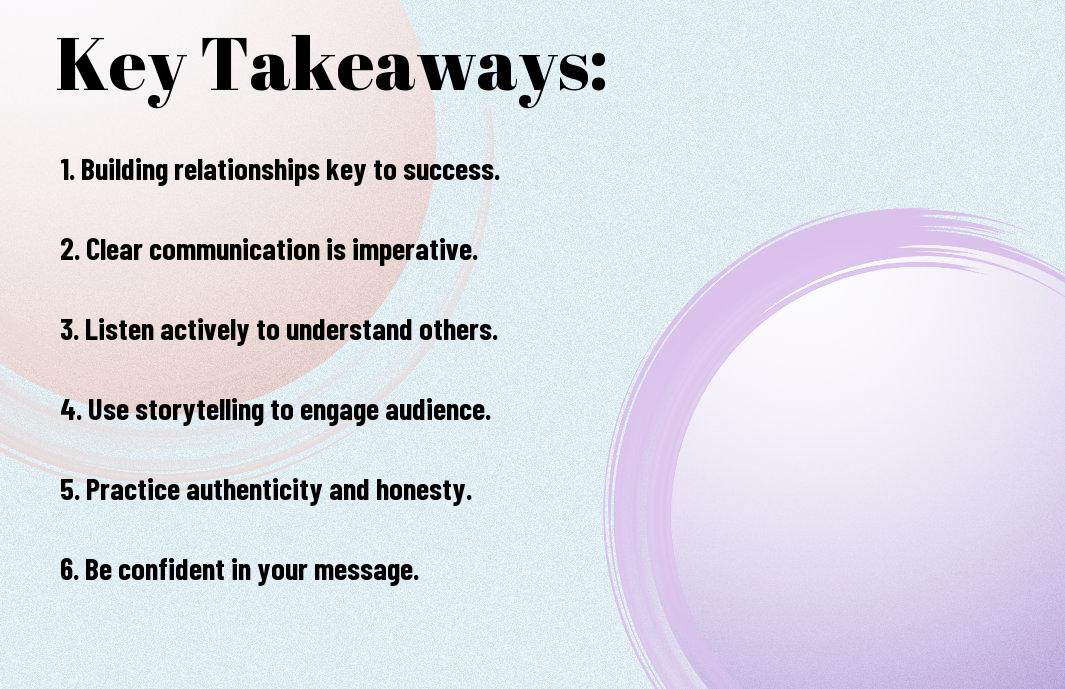Most successful network marketers understand that effective communication is the key to unlocking persuasion and influence in the industry. Mastering the art of communication not only helps you build stronger relationships with your team and prospects but also allows you to inspire action and achieve your goals. In this article, you will discover the crucial strategies and techniques to enhance your communication skills and propel your network marketing business to new heights.
Key Takeaways:
- Understanding the importance of effective communication in network marketing is crucial for success.
- Active listening is a key component of communication that helps in building relationships and understanding others’ perspectives.
- Mastering the art of persuasion and influence can help in growing your network and increasing sales.
- Building rapport and trust with your audience is important for effective communication in network marketing.
- Using storytelling as a powerful communication tool can help in capturing attention and resonating with your audience.
- Engaging with empathy and understanding the needs of your audience can lead to more effective communication and better results.
- Continuous practice and improvement in communication skills is necessary for achieving long-term success in network marketing.

Building a Strong Foundation
Before stepping into the intricacies of communication in network marketing, it’s crucial to establish a strong foundation based on principles of persuasion and influence. Dr. Robert Cialdini’s Seven Principles of Persuasion, as outlined by IAW, serve as a guiding light in understanding how to effectively communicate and connect with your audience.
Identifying Your Audience
Your success in network marketing hinges on your ability to understand and connect with your audience. Take the time to identify who they are, what they value, and what drives their decision-making processes. By truly understanding your audience, you can tailor your message to resonate with them on a deeper level, increasing the likelihood of successful communication and conversion.
Crafting Your Unique Message
Strong communication in network marketing starts with crafting a message that speaks to your audience’s needs and desires. Your message should be clear, concise, and compelling, highlighting the unique benefits of your product or service. By emphasizing what sets you apart from the competition, you can capture the attention and interest of your audience, paving the way for fruitful relationships and partnerships.
Building a successful network marketing business requires a foundation built on effective communication and persuasion. By mastering the art of connecting with your audience and crafting a compelling message, you can leverage the power of influence to grow your network and achieve your goals.
The Power of Storytelling
Any effective communication strategy in network marketing involves mastering the art of storytelling. Stories have a unique way of captivating an audience, making your message more memorable and impactful. According to The Art of Persuasion: 15 Techniques for Influential Communication, storytelling is a powerful tool that can help you connect with your audience on a deeper level and enhance your persuasive abilities.
Connecting with Emotions
Connecting with emotions is a key aspect of storytelling in network marketing. When you tell a compelling story that evokes emotions, you create a more profound impact on your audience. People are more likely to remember and resonate with stories that touch their hearts. By infusing your stories with emotions such as joy, empathy, or inspiration, you can create a lasting impression that motivates others to take action.
Creating Relatable Scenarios
Any successful storyteller knows the importance of creating relatable scenarios that resonate with their audience. When you present scenarios that your listeners can relate to, you make your message more relevant and personal. By incorporating familiar situations, challenges, or aspirations into your stories, you can establish a connection with your audience and make them more receptive to your message.
Creating relatable scenarios is an important element of effective storytelling as it allows your audience to see themselves in the narrative, fostering a sense of identification and understanding. When people can relate to the experiences shared in your stories, they are more likely to engage with your message and be influenced by it.
Mastering Verbal Communication
Keep in mind that effective communication in network marketing starts with mastering verbal communication. The way you convey your message can make a significant impact on the person you are speaking to. To become a more persuasive communicator, it is necessary to work on your active listening and questioning skills.
The Art of Active Listening
The key to successful communication is not just in speaking but in listening attentively. Active listening involves giving your full attention to the person speaking, acknowledging their message, and providing feedback to ensure you understand correctly. When you actively listen, you show respect and interest in the other person’s thoughts, which strengthens the bond between you and enhances your persuasive abilities.
Effective Questioning Techniques
Mastering effective questioning techniques is crucial in network marketing. By asking the right questions, you can uncover valuable information about your prospect’s needs, interests, and concerns. This knowledge allows you to tailor your message accordingly, addressing their specific needs and increasing the chances of making a successful connection and closing the deal.
Engage in open-ended questions that encourage the other person to elaborate and share more about themselves. Techniques like mirroring, where you repeat a key word or phrase back to the speaker, can help you build rapport and demonstrate that you are actively listening and interested in what they have to say.

Nonverbal Cues and Body Language
Despite the power of words, communication is more than just what you say. Nonverbal cues and body language play a crucial role in how your message is received and understood. Mastering these aspects can make you a more effective network marketer, helping you to persuade and influence others.
Projecting Confidence and Authority
One of the key elements of nonverbal communication is projecting confidence and authority. When you walk into a room or engage in a conversation, your body language speaks volumes before you even say a word. Standing tall, making eye contact, and using gestures purposefully can convey that you are confident in yourself and what you are saying. People are naturally drawn to those who exude confidence and authority, making it easier for you to build rapport and credibility in the network marketing industry.
Reading and Responding to Others’ Cues
Others are constantly sending out nonverbal cues that can give you valuable insights into their thoughts and feelings. Being able to read and respond to these cues can help you tailor your communication to be more persuasive and impactful. Paying attention to facial expressions, tone of voice, and body movements can clue you in on how your message is being received. By adapting your approach based on these cues, you can establish a deeper connection with your audience and navigate conversations more effectively.
Additionally, mirroring the body language of the person you are interacting with can help create a sense of trust and rapport. People tend to feel more comfortable and connected with those who mirror their gestures and posture, leading to smoother communication and increased influence.

Persuasion Strategies
Building Rapport and Trust
One of the most critical aspects of effective communication in network marketing is building rapport and trust with your audience. People are more likely to listen to and be persuaded by someone they feel a connection with. To do this, focus on being genuine, listening actively, and showing empathy towards others. By understanding their needs and concerns, you can tailor your communication to address them directly, establishing a solid foundation of trust.
Using Social Proof and Testimonials
With social proof and testimonials, you can leverage the power of influence to persuade others to join your network marketing venture. When people see that others have had positive experiences or success with your product or business opportunity, they are more likely to trust your claims and consider taking the same path. Understanding the psychology behind social proof can help you strategically incorporate testimonials into your communication to sway prospects in your favor.

Overcoming Objections and Concerns
Not effectively addressing objections and concerns can hinder your success in network marketing. It is crucial to master the art of persuasion and effective communication to navigate through these challenges. Learning how to overcome objections and concerns can significantly impact your ability to influence and persuade others in the industry. For more insights on mastering persuasion through communication, check out Master the Art of Persuasion with Effective Communication.
Anticipating and Addressing Fears
Fears are natural when launching on a new venture, but in network marketing, they can be a significant barrier. Addressing common fears such as failure, rejection, or skepticism is crucial. By empathizing with your prospect’s concerns and proactively providing reassurance and solutions, you can build trust and credibility in your interactions.
Offering Solutions and Alternatives
Anticipating potential objections and offering solutions and alternatives beforehand demonstrates your preparedness and commitment to supporting your prospects. By presenting clear strategies to mitigate risks or address uncertainties, you empower your audience to make informed decisions. This approach not only alleviates concerns but also showcases your expertise and dedication to helping others succeed in the network marketing business.
Concerns often arise due to a lack of information or misconceptions. By actively listening to your prospect’s objections and providing well-thought-out responses, you can turn their concerns into opportunities for meaningful dialogue and mutual understanding. Keep in mind, addressing concerns with empathy and professionalism can strengthen your relationships and pave the way for successful collaborations in network marketing.
Summing up
Upon reflecting on ‘The Art of Effective Communication in Network Marketing – Secrets to Persuasion and Influence’, you have now gained insight into the crucial elements necessary to excel in network marketing. By focusing on building relationships, actively listening, and tailoring your communication to meet the needs of your audience, you are well on your way to becoming a persuasive and influential network marketer. Keep in mind, the key to success lies in your ability to effectively communicate and connect with others.
As you continue on your network marketing journey, keep in mind that honing your communication skills is an ongoing process. Practice active listening, adapt your communication style as needed, and always strive to build trust and rapport with those you interact with. By mastering the art of effective communication, you will not only enhance your persuasive abilities but also strengthen your network and increase your chances of success in the dynamic world of network marketing.
Q: What is network marketing?
A: Network marketing is a business model where individuals build their own sales network to sell products or services, typically through direct selling or word-of-mouth marketing.
Q: Why is effective communication important in network marketing?
A: Effective communication is crucial in network marketing as it helps to build relationships, convey the benefits of the products or services, and persuade others to join or purchase.
Q: What are some key strategies for effective communication in network marketing?
A: Some key strategies for effective communication in network marketing include active listening, building rapport, using storytelling, asking open-ended questions, and being genuine and authentic.
Q: How can persuasion and influence techniques be applied in network marketing?
A: Persuasion and influence techniques can be applied in network marketing by understanding the needs and motivations of your audience, using social proof, offering incentives, and utilizing the principles of reciprocity and scarcity.
Q: How can one improve their communication skills for network marketing?
A: One can improve their communication skills for network marketing by practicing active listening, studying effective communicators, attending training or workshops, seeking feedback, and constantly refining and adapting their approach.



